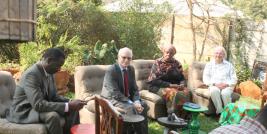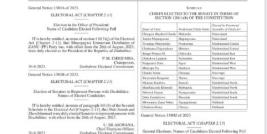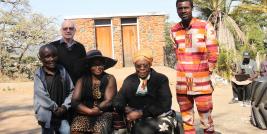The United States and Australia now stand out for their ongoing “smart sanctions” on Zimbabwe individuals and entities, after the European Union delisted everyone, and the United Kingdom delisted all but one person earlier in 2025. The Zimbabwe Information Cente continues to campaign for an end to the entire sanctions regime on Zimbabwe.
On May 27, 2025, the UK announced the delisting of sanctions against individuals Owen Ncube, Isaac Moyo, Godwin Matanga, Anselem Sanyatwe, and the entity Zimbabwe Defence Industries (ZDI). That left Kudakwashe Regimond Tagwirei as the only Zimbabwean person facing travel restrictions and an asset freeze in the United Kingdon, on the grounds that he is a financial criminal.
In February 2025, the European Union delisted their last remaining entity (ZDI) whilst renewing their existing Zimbabwe sanctions framework, which is an arms embargo on Zimbabwe. The European Union ceased listing individuals in Zimbabwe for sanction in February 2022.
As at May 2025, Australia had smart sanctions on five individuals and one entity i.e. Augustine Chihuri, Constantine Chiwenga, Grace Mugabe, Happyton Bonyongwe, Phillip Valerio Sibanda, and ZDI. It is important to note that three - Chihuri, Bonyongwe and Grace Mugabe - were deposed in 2017, and Chiwenga and Sibanda played crucial roles in deposing them.
New British policy
The United Kingdom's Minister for Africa, Lord Collins visited Zimbabwe in June 2025 and met president Mnangagwa. This was the first UK ministerial visit in seven years. Collins confirmed a "new approach" focused on partnership and mutual respect between the former colonial power and the Southern African nation.
Speaking to journalists after the meeting, Collins emphasized that the UK government under Prime Minister Keir Starmer seeks a collaborative relationship grounded in listening to Africa's priorities rather than imposing its own agenda.
US maintains heavy hand
On March 4, 2024, US President Joe Biden signed an Executive Order to terminate Executive Orders of Presidents Bush and Obama from 2003, 2005 and 2008 which had placed sanctions on a large number of individuals and companies by declaring that there was a state of emergency in Zimbabwe.
But on the same day, March 4, 2024, the US Treasury Department placed new sanctions under the Global Magnitsky Human Rights Accountability Act on the President of Zimbabwe, Emmerson Mnangagwa, his wife Auxilia, Vice President Constantino Chiwenga, Kudakwashe Tagwirei and his wife Sandra Mpunga, Sakunda Holdings and Fossil Agro - two Tagwirei companies, Obey Chimuka, a partner of Tagwirei, and Fossil Contracting, owned by Chimuka, Oppah Muchinguri, Defence Minister since 2018, Godwin Matanga, Commissioner General of the Zimbabwe Republic Police, Stephen Mutamba, Deputy Commissioner General of the ZRP, Walter Tapfumaneyi , Deputy Director-General of the Central Intelligence Organisation, and Owen Ncube, Minister of State Security from 2018 to 2022.
In effect, people who removed the Mugabe group from power in November 2017 were placed on the list.
These fourteen were alleged to be engaged in corrupt smuggling of gold and diamonds, and of violations of human rights.
The March 2024 adjustments did not change the risk assessment of US banks that any transaction with a person or company in Zimbabwe may breach the sanctions and lead to a heavy fine. And so there is no practical improvement in the economic situation for Zimbabwe.
The sanctions are supposed to be “targeted” and not aimed at the broad population, but the effect has been the opposite, to cut off all Zimbabweans from the mainstream financial world.
The ongoing US sanctions regime against Zimbabwe is more motivated by US geopolitical concerns about China and Russia, and less about human rights and corruption.















